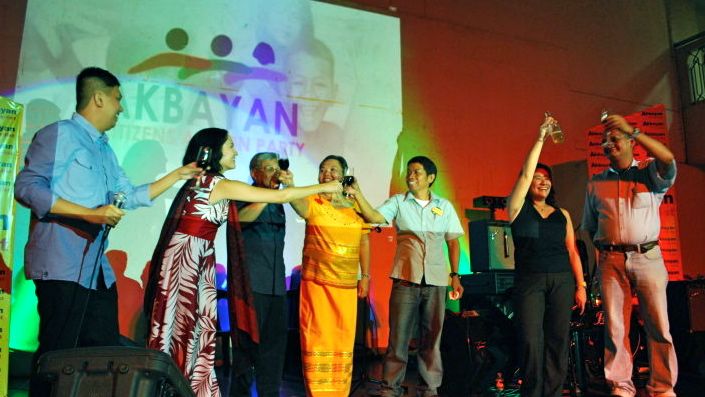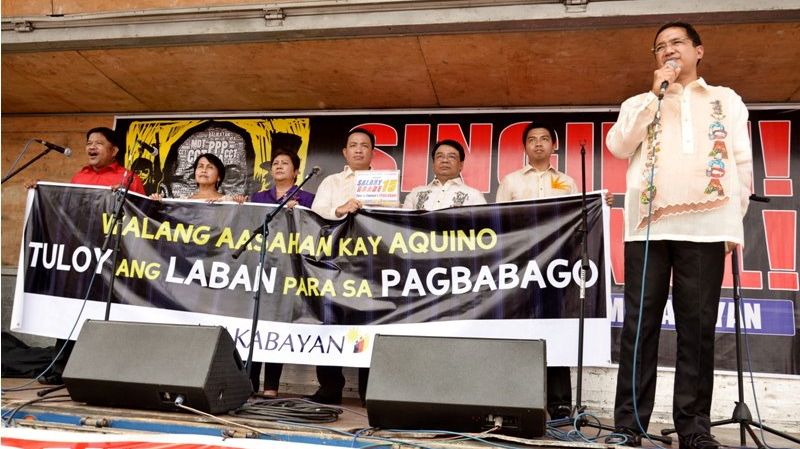SUMMARY
This is AI generated summarization, which may have errors. For context, always refer to the full article.

MANILA, Philippines – Is Akbayan’s proximity to the corridors of power an indication that it has ceased to represent the marginalized? Its critics are asking this question.
Risa Hontiveros-Baraquel, Akbayan spokesperson, has been seen with President Benigno Aquino III in various photo opportunities. She ran for the Senate under the President’s ticket in 2010 but lost. She is seeking a second senatorial run for the May 2013 polls under the administration slate.
When Aquino won the presidency, many Akbayan party-list leaders were appointed to various positions in government.
Former Akbayan president and the party-list group’s first representative in Congress, Loretta Ann Rosales, was appointed chairperson of the Commission on Human Rights. Joel Rocamora, another former Akbayan president, was designated National Anti-Poverty Commission head. Percival Cendaña, former Akbayan national chairperson, became commissioner-at-large of the National Youth Commission.
Presidential political affairs adviser Ronald Llamas was former Akbayan president. President Aquino defended Llamas when he came under fire when TV cameras caught an AK-47 in his car after it figured in an accident and when he himself was caught on camera buying fake DVDs.
“They cannot possibly claim that they are marginalized and underrepresented when their leaders hold various positions in government,” Anakbayan national chairperson Vencer Crisostomo said in a statement over the weekend.
Favored party-list?
Anakbayan called on the Commission on Elections (Comelec) to disqualify Akbayan, claiming that the party-list group is President Aquino’s “favorite.”
“Allowing Akbayan to run is like allowing Malacañang and the President’s KKK (kaklase, kaibigan, kabarilan — in reference to the President’s classmates, friends and shooting buddies) to run for party-list. Comelec’s ‘cleansing’ of the party-list system would be meaningless if it would turn a blind eye to Akbayan,” the youth leader said.
Late this week, the poll watchdog Kontra Daya also called on President Aquino to tell his allies to back off from the 2013 party-list race.
“For the sake of the integrity and credibility of the partylist system, President Aquino should tell his allies who are not marginalized and are in fact well-entrenched in government, to back off from the partylist system,” Kontra Daya convenor Fr Joe Dizon implored in a statement on Friday, September 28.
In the list of nominees that Akbayan submitted to Comelec together with its manifestation of intent to participate in the 2013 polls, two of its prospective party-list representatives are presidential appointees. Second nominee Barry Gutierrez is Malacañang’s undersecretary for political affairs while the 3rd nominee, Angelina Ludovice-Katoh, is a member of the Presidential Commission for the Urban Poor.
Pioneer party-list
Akbayan Youth however came to the defense of the party, arguing that it is a pioneer multi-sectoral party-list group composed of workers, farmers, women, youth, professionals, informal settlers, and the LGBT (lesbians, gays, bisexuals and transgenered) community.
“It is one of the few original party-list organizations since 1998 which has consistently championed the interest of the marginalized and underrepresented,” Akbayan Youth National Spokesperson JC Tejano said in disputing Crisostomo’s claim.
Akbayan ran in the party-list elections as early as 1998. It won two seats in the 2010 polls.
“Its leaders who have been consistently elected in congress have championed numerous social issues like the extension of the agrarian reform program, and the passage of important pieces of legislation like the National Land Use Bill, the Right to Labor Organization Law and Cheaper Medicines Act,” Tejano said.
Political rivals
Tejano also stressed that Akbayan was one of the left-leaning political parties that supported the enacment of the party-list law in 1998.
“While the extreme Left to which Mr Crisostomo’s group belongs was still clinging to its ‘boycott election’ policy, Akbayan was already busy pushing for the implementation of the party-list system to encourage the people’s meaningful participation in our electoral exercise and bring the voice of the marginalized to the halls of Congress,” Tejano said.
Anakbayan and Akbayan Youth belong to rival groups in the Philippine political Left.
Anakbayan is allied with the national democrats who are being accused by the military as front organizations of the communist underground. Akbayan Youth is a member of Akbayan which is composed of socialists, social democrats, former communists and unaligned activists.
The national democrats started to participate in the party-list election in 2001, dominating the progressive bloc in the House of Representatives since then. At present, they have 7 party-list representatives from groups under the Makabayan coalition: Bayan Muna (2), Gabriela Women’s Party (2), Anakpawis (1) Alliance of Concerned Teachers (1), and Kabataan (1), of which Anakbayan was a founding member.
During the 2010 elections, Akbayan campaigned for President Aquino while the national democrats such as Bayan Muna and Anakbayan supported Sen Manuel VIllar’s presidential bid.
For the 2013 senatorial race, Akbayan is fielding Hontiveros-Baraquel, who is part of the administration slate together with Villar’s wife former Las Piñas Rep Cynthia Villar.
Bayan Muna and its affiliates, on the other hand, are campaigning for Teddy Casiño, who is not running under any of the two major coalitions.

Disqualified party-list groups
Anakbayan vowed to challenge Akbayan’s accreditation if Comelec allows the party-list group to run.
It alleged that “while Comelec allows Palace-backed partylists to run, accreditation of some legitimate groups like Kalikasan and Courage [has] been rejected.”
“We will come out with a final determination by the end of October,” Comelec spokesperson James Jimenez said.
In a earlier resolution, the Comelec said it will review and affirm the grant of registration and accreditation to party-list groups “in view of its role in ensuring that only those parties, groups, or organizations with the requisite character consistent with the purpose of the party-list system is registered and accredited.”
So far, Comelec has already blocked 17 party-list groups from participating in the 2013 elections.
Akbayan saw it coming
But regardless of the rivalry among left-leaning groups, the exclusion of party-list groups like Akbayan was bound to happen.
Akbayan itself expressed this concern when the Supreme Court ruled in the 2001 case Ang Bagong Bayani-OFW Party vs Commission on Elections that the party-list election was only envisioned to allow the participation of marginalized and underrepresented sectors.
In a Newsbreak article, former Akbayan vice president Ric Reyes said that “as civil society progresses, a tie-up with government is not far-fetched.”
Anticipating that Akbayan might “receive funding from government” in the future, Reyes feared that — because of the SC ruling — it might be considered as “an adjunct of government,” hence classifying the party-list group as non-marginalized.
The High Court used this as basis for disqualifying 3 winning groups at the time: Mamamayan Ayaw sa Droga (MAD), the Association of Philippine Electric Cooperatives (Apec), and the Veterans Federation Party (VFP). The Court said that these 3 parties did not fall under the category “marginalized sectors.”
Akbayan earlier criticized party-list groups — such as MAD — that it believed were supported by the government.
Disqualification guidelines
Sought for comment, Deputy Presidential Spokesperson Abigail Valte said that “disqualification should be based on lack of compliance or credentials and not merely on affiliations or their support for the President’s programs.”
“There are very clear provisions in the Constitution, other pertinent laws and regulations on the matter of the credentials of those seeking to be accredited as party-list groups, and the evaluation should be made on whether or not these groups meet those requirements,” Valte told Rappler.
The Supreme Court, in the Ang Bagong Bayani-OFW Party vs Commission on Elections case, set 8 guidelines for screening party-list groups like political parties, sectors, organizations or coalitions:
- The parties must comply with the declared statutory policy of enabling “Filipino citizens belonging to marginalized and underrepresented sectors” to be elected;
- The religious sector may not be represented in the party-list system;
- The parties must not be disqualified under Section 6 of RA 7941 (Party-List System Act);
- The parties must not be an adjunct of, or a project organized or an entity funded or assisted by, the government;
- The parties must not only comply with the requirements of the law; its nominees must likewise do so;
- The parties must represent the marginalized and underrepresented sectors; so also must its nominees;
- The parties must likewise be able to contribute to the formulation and enactment of appropriate legislation that will benefit the nation
– Rappler.com
More from #PHVote, Rappler’s 2013 Election Coverage: |
Add a comment
How does this make you feel?
There are no comments yet. Add your comment to start the conversation.